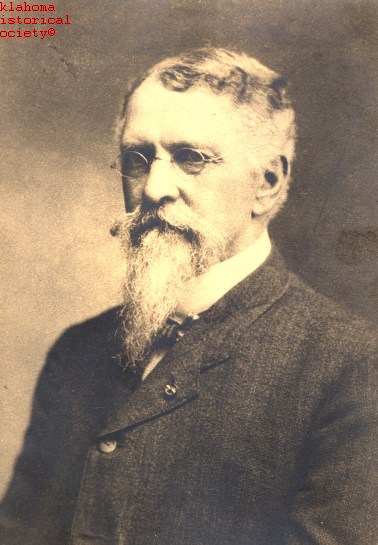The Encyclopedia of Oklahoma History and Culture
CLAYTON, WILLIAM HENRY HARRISON (1840–1920).
An attorney and a judge of the United States Court for the Indian Territory, William Henry Harrison Clayton was born to John and Ann Clayton near Delaware, Pennsylvania, on October 13, 1840, during the presidential contest between incumbent Martin Van Buren and challenger William Henry Harrison. Clayton's Whig parents named him for the victorious Harrison. During the Civil War, Clayton fought for the Union, serving in Company H of the 124th Pennsylvania Infantry. He saw action at South Mountain, Antietam, Fredericksburg, and the Wilderness. After the war, he returned to Arkansas, studied law, married Florence Barnes in 1868, and was admitted to the State Bar of Arkansas in 1871.
In 1875 Pres. U. S. Grant appointed Clayton as United States Attorney for the Western District of Arkansas, beginning a long association with Arkansas and Indian Territory. Because Clayton was a political appointee, his tenure was subject to the shifting winds of presidential politics. When Grover Cleveland captured the White House for the Democrats in 1884, Clayton lost his position as United States Attorney, regaining it when Benjamin Harrison, grandson of his namesake, defeated Cleveland in 1888. Cleveland's victory over Harrison in 1892 again cost Clayton his job. During Clayton's years as the United States lawyer for the Western District of Arkansas, Isaac Parker was district judge. Clayton prosecuted many of the cases that ended on the gallows at Fort Smith and earned Judge Parker the sobriquet "Hanging Judge." The Parker and Clayton families were close, a daughter of the Claytons marrying a son of the Parkers.
In 1897 William McKinley recaptured the White House for the Republicans, and Clayton again received a presidential appointment. However, this time the appointment was to the bench, as a judge of the Central District of the United States Court for the Indian Territory. The court had begun in 1889 with limited subject matter jurisdiction, but when Clayton joined the bench in 1897 the court had "exclusive original jurisdiction of all offenses committed against the laws of the United States, committed in said Territory." Thus, the jurisdiction of federal courts located outside Indian Territory over crimes committed inside Indian Territory ended, and the Indian Territory Court's jurisdiction now included capital cases.
The Central District was the Choctaw Nation. Court towns included South McAlester, Atoka, Antlers, Cameron, Poteau, and Wilburton. One person whom Judge Clayton sentenced to death was Dora Wright, for the murder of Annie Williams, an eight-year-old child. When Wright sought presidential clemency, Clayton refused to join the request. Wright was the only woman executed under sentence of the Indian Territory Court. While sitting on the Indian Territory Court of Appeals, Judge Clayton authored an opinion holding "that citizens of the African race have a constitutional right to sit upon our grand and petit juries, and that any abridgement of that right because of their race or color is unlawful." Binyon v. United States, 76 S.W. 265, 4 Ind.Terr.651 (Ind.Terr.Ct.Apps., 1903.) The appellate court held that the evidence was insufficient to support a finding of racial discrimination in juror selection.
Judge Clayton served on the Indian Territory Court until Oklahoma was admitted to the Union in 1907. After his judicial service ended, he remained in McAlester until his death on December 14, 1920. He is buried in the National Cemetery at Fort Smith.
See Also
CAPITAL PUNISHMENT, FEDERAL DISTRICT COURT FOR WESTERN ARKANSAS, JOSEPH ALBERT GILL, HOSEA TOWNSEND
Learn More
"William Henry Harrison Clayton," Vertical File, Oklahoma Historical Society, Oklahoma City.
Von Russell Creel, "Capital Punishment and the United States Court for the Indian Territory," The Chronicles of Oklahoma 81 (Summer 2003).
Von Russell Creel, "Fifteen Men in Ermine: Judges of the United States Court for the Indian Territory, 1889–1907," The Chronicles of Oklahoma 86 (Summer 2008).
Indian Journal (Eufaula, Oklahoma), 16 December 1920.
Citation
The following (as per The Chicago Manual of Style, 17th edition) is the preferred citation for articles:
Von Russell Creel, “Clayton, William Henry Harrison,” The Encyclopedia of Oklahoma History and Culture, https://www.okhistory.org/publications/enc/entry?entry=CL018.
Published November 3, 2015
© Oklahoma Historical Society


